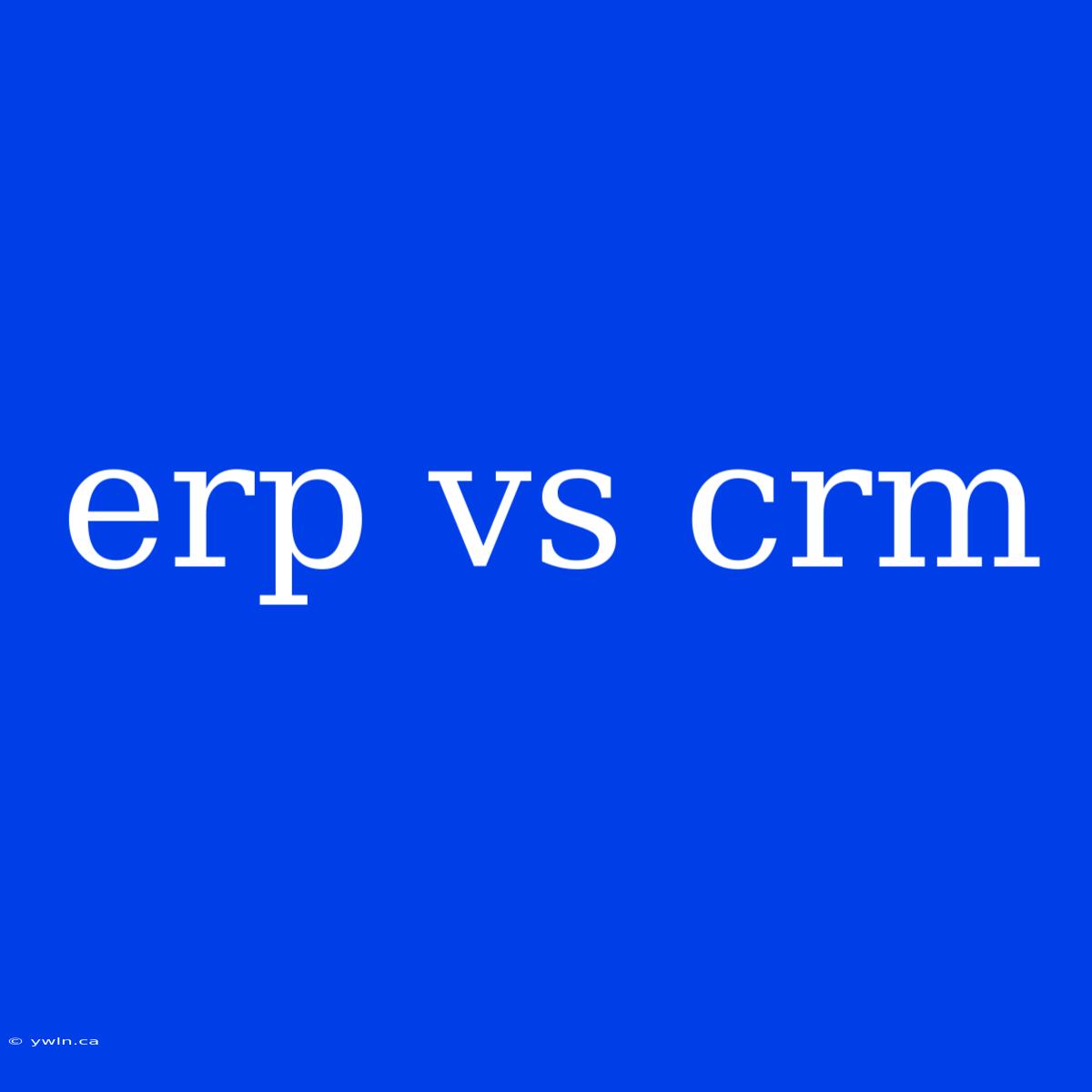ERP vs CRM: Understanding the Difference and Choosing the Right Solution
What is the difference between ERP and CRM? A lot of people get confused by these two terms, as they both represent business software solutions. ERP (Enterprise Resource Planning) and CRM (Customer Relationship Management) are integral tools for modern businesses, but they serve distinct purposes. This article delves into their core functionalities, benefits, and how to choose the right solution for your needs.
Editor Note: This article discusses the differences between ERP and CRM systems and provides helpful guidance for businesses seeking to implement these crucial solutions. Understanding these systems and their capabilities is crucial for optimizing business operations, customer engagement, and overall growth.
Analysis: We have conducted thorough research and analyzed various sources to provide a comprehensive overview of the ERP vs CRM landscape. This guide aims to equip businesses with the necessary knowledge to make informed decisions about choosing the right software solution.
Key Takeaways:
| Feature | ERP | CRM |
|---|---|---|
| Focus | Internal operations, data integration | Customer interactions, relationship building |
| Key Functions | Finance, inventory, supply chain, manufacturing | Sales, marketing, service, customer support |
| Target Audience | All departments within a company | Sales, marketing, customer service teams |
| Examples | SAP, Oracle, Microsoft Dynamics 365 | Salesforce, HubSpot, Zoho |
ERP
Introduction: ERP systems act as the backbone of a business, centralizing and managing critical data across multiple departments, fostering efficiency and streamlining internal processes.
Key Aspects:
- Integrated Data: Consolidates all core business data, ensuring consistent information across departments.
- Process Automation: Automates repetitive tasks like inventory management, order processing, and accounting.
- Reporting and Analytics: Provides insights into business performance, enabling data-driven decision-making.
Discussion: ERP systems aim to integrate all departments within a company, from finance and human resources to production and logistics. They offer a holistic view of the business, enabling organizations to improve efficiency, optimize resource allocation, and gain a competitive edge.
CRM
Introduction: CRM systems focus on managing customer relationships and improving interactions with them. They help businesses understand customer needs, preferences, and behavior, fostering loyalty and maximizing customer value.
Key Aspects:
- Customer Data Management: Stores comprehensive customer data, including demographics, purchase history, and interactions.
- Sales Automation: Automates sales tasks, from lead generation and qualification to opportunity management and forecasting.
- Marketing Automation: Enables personalized campaigns, targeted content, and efficient communication with customers.
Discussion: CRM systems provide a 360-degree view of customers, empowering businesses to tailor their offerings, optimize marketing efforts, and deliver exceptional customer service. This leads to improved customer satisfaction, increased retention, and stronger relationships.
Choosing the Right Solution:
Introduction: Choosing between ERP and CRM depends on your business needs and goals. Consider the following factors:
- Size and Complexity: For smaller businesses, a CRM system might suffice, while larger organizations may require an ERP to manage complex operations.
- Business Focus: If customer relationships are paramount, a CRM is essential. If you require integrated internal processes and data management, an ERP is likely more suitable.
- Budget and Resources: Both solutions come with varying costs and require resources for implementation and maintenance.
Further Analysis:
- Hybrid Solutions: Some businesses opt for hybrid solutions, integrating ERP and CRM systems to leverage the benefits of both.
- Cloud vs. On-Premise: Cloud-based ERP and CRM solutions offer scalability and affordability, while on-premise solutions offer greater control and customization.
Closing: The choice between ERP and CRM depends on your specific needs and goals. Understanding their functionalities, benefits, and limitations is crucial for making an informed decision.
FAQ
Introduction: Here are answers to some frequently asked questions about ERP and CRM:
Questions:
- Can I use both ERP and CRM? Yes, you can use both systems and integrate them for a more comprehensive approach.
- Which solution is better for a small business? A CRM system is typically a better choice for small businesses as it focuses on customer relationship management.
- Are ERP and CRM software expensive? Yes, but cloud-based solutions offer more affordable pricing models.
- Do I need an IT specialist to implement these systems? Most vendors offer implementation services, but it's helpful to have internal IT knowledge.
- What are the benefits of using an ERP system? ERP systems streamline internal processes, improve data accuracy, and provide valuable insights into business performance.
- How does a CRM system help my business? CRM systems improve customer interactions, optimize marketing efforts, and increase customer satisfaction.
Summary: Both ERP and CRM systems play vital roles in optimizing business operations and achieving growth. Understanding their unique functionalities and choosing the right solution based on your business needs is crucial for success.
Tips for Choosing the Right Solution:
Introduction: Here are some tips to guide your selection of an ERP or CRM system:
Tips:
- Define your business needs: Clearly articulate your goals and objectives for the software solution.
- Research different vendors: Explore reputable ERP and CRM providers and compare their features and functionalities.
- Seek expert advice: Consult with IT professionals or business consultants for guidance on choosing the right solution.
- Consider scalability: Select a system that can grow with your business as you expand.
- Explore integration options: Consider systems that integrate with other existing tools you use.
- Test drive the software: Request a demo or trial version to see the system in action.
Summary: Selecting the right ERP or CRM system is an important decision. By following these tips, businesses can find a solution that aligns with their needs and goals, paving the way for operational efficiency, customer engagement, and sustainable growth.
Closing: Both ERP and CRM are powerful tools that can revolutionize your business operations and customer relationships. Take the time to understand their distinct capabilities and choose the solution that best aligns with your unique needs. This strategic decision will ultimately drive growth, efficiency, and success for your business.

